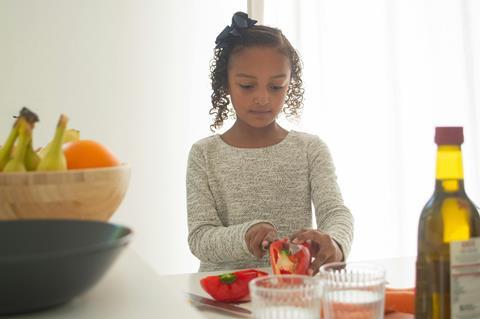Cancer Research UK has just released research tracking junk food advertising on young people’s social media feeds. In addition to the negative physical health implications of junk food, Nate Jones from the Ugly Duckling Company considers the impact on the mental and spiritual health of children and young people

I love the scene in the film Willy Wonka and the Chocolate Factory when the winners of the Golden Ticket enter a room where the grass, trees, and everything visible is edible. I fully understand why, despite the warning, one of the children drinks from the chocolate river.
I enjoy healthy food—but I also enjoy crisps, biscuits, cakes, and fast food too. Regulating our diets is really important. The food we eat doesn’t just impact our physical health—it also plays a significant role in how we feel, think, and behave. For children and young people, a balanced diet supports brain function, emotional stability, and overall well-being. As those who look out for young people, we have the opportunity to guide them toward healthier eating habits that nurture the body, mind, and soul.
How diet affects mental health
A poor diet can lead to:
- Mood swings and irritability: Fluctuating blood sugar levels can make young people feel tired, anxious, or emotional.
- Increased risk of depression: Diets high in processed foods and sugar have been linked to higher rates of depression and anxiety.
- Lower concentration and energy: Nutrient-rich foods help maintain steady energy levels and cognitive performance.
- Weakened immune function: A strong immune system supports overall resilience and well-being.
We need a steady source of fuel from the foods we eat. Without it, our bodies and minds don’t function as well as they could.
Key nutrients for mental well-being
However, what is much harder to ascertain is which types of food impact our emotional well-being. One 2014 study found high levels of well-being were reported by individuals who ate more fruit and vegetables. There is also evidence that the Mediterranean diet, which is rich in vegetables and olive oil, has mental health benefits, such as offering some protection against depression and anxiety. Whilst there is not enough clear evidence to say exactly what young people should eat to support their mental health, we can still promote the importance of eating a healthy diet, as this is good for our bodies. This includes:
- Omega-3 fatty acids (found in fish, flaxseeds, and walnuts) support brain function.
- Complex carbohydrates (like whole grains) help stabilize blood sugar and mood.
- B vitamins (from leafy greens and eggs) contribute to energy and mental clarity.
- Protein (found in lean meats, beans, and dairy) aids in neurotransmitter production, essential for emotional balance.
By fostering healthy eating habits, we empower young people to care for their mental and emotional well-being while honouring the bodies God has given them.
By eating a varied and balanced diet, young people should be able to get all the energy and nutrients they need from the food and drink they consume, allowing their bodies to grow and develop properly. Other top tips include eating breakfast, getting your five a day, choosing healthier snacks, and staying hydrated. It is also important that if people are concerned about their health or their relationship with food, they visit their GP.
Eating together: More than just nutrition
God has designed our bodies so they thrive when we look after them, but beyond what young people eat, who they eat with also matters. Shared meals provide time for connection, conversation, and relationship-building. Jesus often shared meals with others. Eating with others and enjoying the social aspect that comes with it can have a positive impact on our well-being, as it provides extra time to strengthen and improve our relationships, whilst allowing us to slow down and savour the food we’re eating.
The opportunity to enjoy the company of those around us as we eat arises as we take time to talk about our experiences, share stories, interests, jokes, and funny clips we have found online. It can also afford us the opportunity to talk about problems and challenges we may face. Eating together can help us to feel included, valued, and loved, bringing a positive impact to our well-being through the power of connecting with other people. It creates community.
Read more:
Sweet dreams - Sleep is foundational for the mental and spiritual health of youth and children
Practical tips for healthy eating
- Encourage balanced meals: Use the NHS Eatwell Guide as a reference—maybe plan a menu together as a family to help everyone understand what a balanced diet looks like.
- Prioritise breakfast: It fuels the brain and body for the day. Also, don’t skip meals.
- Stay hydrated: Drinking enough water supports energy and focus. You can buy water bottles with hour markers to help you track how much to drink each hour.
- Teach food as fuel: Help young people understand how good nutrition impacts their daily life and their well-being.
- Cook together: Helping children and young people to cook is not only a good life skill but also a time to talk, share, and learn together.
As much as I think I would enjoy having access to a chocolate river and edible trees, I know deep down that God has created our bodies to thrive. By fostering healthy eating habits, we empower young people to care for their mental and emotional well-being while honouring the bodies God has given them.
This article was originally published in May 2025 and has been republished in response to the Cancer UK research.


































